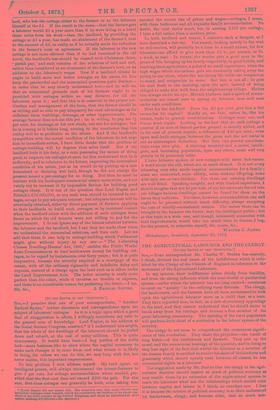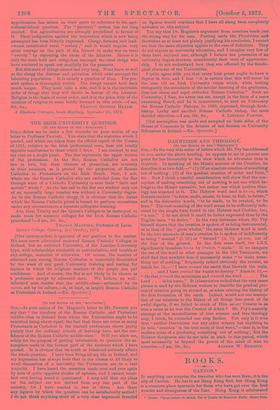THE AGRICULTURAL LABOURER AND THE CLERGY.
[TO THE EDITOR OF THE "SPECTATOR.']
Sin,.—Your correspondent Mr. Charles W. Stubbs has scarcely, I think, divined the real cause of the indifference which is exhi- bited by the Clergy of the Church of England in reference to the movement of the Agricultural Labourers.
In my opinion, their indifference arises chiefly from timidity, and from the strong influence which the semi-feudal or patriarchal system—under which the labourer has too long existed—continues to exert on " society" in the outlying rural districts. The clergy, the landowners, and the farmers have all been accustomed to look upon the agricultural labourer more as a child than as a man. They have regarded him, in fact, as a sort of necessary appendage to the land, and they cannot understand that he should desire to break away from his tutelage and become a free member of the great labouring community. The uprising of the rural population will produce little short of a revolution in the labour system of the country.
The clergy do not seem to comprehend the economical signifi- cance of this revolution. They share the prejudice—the result of long habit—of the landowners and farmers. They mix up the moral and the commercial bearings of the question, and in doing so they lose sight of the fact that whilst the labourer as a member of the human family is entitled to receive his share of the kindness and generosity which should equally exist between all classes, he has commercial rights as a labourer.
The suggestion made by Mr. Stubbs that the clergy in the Agri- cultural districts should master so much of political economy as may enable them by an extension of the night-school system to teach the labourers what are the relationships which should exist between capital and labour is, I think, an excellent one. I fear it is because the science of political economy is so little understood by landowners, clergy, and farmers alike, that so much wig-
apprehension has arisen on their parts in reference to the agri- cultural-labour question. The " paternal" system has too long existed. But agriculturists are strongly prejudiced in favour of it. Their indignation against the innovation which is now being attempted has been bitterly expressed. Clergy, farmers, and land- owners constituted rural "society ;" and it would require very great courage on the part of the farmer to make war on rural " society " by espousing the cause of the labourer. Hence it is only the more bold and outspoken amongst the rural clergy who have ventured to speak out manfully for the peasants.
But this state of things cannot last very long. None know so well as the clergy the distress and privation which exist amongst the labouring population. It is merely a question of time. The pre- sent system is thoroughly rotten. The clergy cannot hold back much longer. They must take a side, and it is in the inevitable order of things that they will decide in favour of the labourer. Religion is the basis of social order, and it is the plain duty of the minister of religion to come boldly forward in this crisis.—I am,



































 Previous page
Previous page